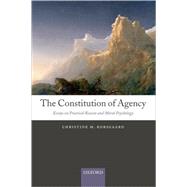The Constitution of Agency Essays on Practical Reason and Moral Psychology
, by Korsgaard, Christine M.- ISBN: 9780199552740 | 0199552746
- Cover: Paperback
- Copyright: 12/15/2008
Christine M. Korsgaard is one of today's leading moral philosophers: this volume collects ten influential papers by her on practical reason and moral psychology. Korsgaard draws on the work of important figures in the history of philosophy such as Plato, Aristotle, Kant, and Hume, showing how their ideas can inform the solution of contemporary and traditional philosophical problems, such as the foundations of morality and practical reason, the nature of agency, and the role of the emotions in action. In Part 1, The Principles of Practical Reason , Korsgaard defends the view that the principles of practical reason are constitutive principles of action. By governing our actions in accordance with Kant's categorical imperative and the principle of instrumental reason, she argues, we take control of our own movements and so render ourselves active, self-determining beings. She criticizes rival attempts to give a normative foundation to the principles of practical reason, challenges the claims of the principle of maximizing one's own interests to be a rational principle, and argues for some deep continuities between Plato's account of the connection between justice and agency and Kant's account of the connection between autonomy and agency. In Part II, Moral Virtue and Moral Psychology, Korsgaard takes up the question of the role of our more passive or receptive faculties--our emotions and responses --in constituting our agency. She sketches a reading of the Nicomachean Ethics , based on the idea that our emotions can serve as perceptions of good and evil, and argues that this view of the emotions is at the root of the apparent differences between Aristotle and Kant's accounts of morality. She argues that in fact, Aristotle and Kant share a distinctive view about the locus of moral value and the nature of human choice that, among other things, gives them account of what it means to act rationally that is superior to other accounts. In Part III, Other Reflections, Korsgaard takes up question how we come to view one another as moral agents in Hume's philosophy. She examines the possible clash between the agency of the state and that of the individual that led to Kant's paradoxical views about revolution. And finally, she discusses her methodology in an account of what it means to be a constructivist moral philosopher. The essays are united by an introduction in which Korsgaard explains their connections to each other and to her current work.






